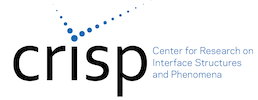2017 Materials and Manufacturing Summer Teachers Institute
July 25 – 27, 2017
The Materials and Manufacturing Summer Teachers Institute is a school-to-career initiative that targets STEM skills instruction in the New Haven and Bridgeport Public Schools grades 7-12. The project is sponsored by the New Haven Manufacturers Association (NHMA) and the Center for Research on Interface Structures Phenomena (CRISP), a National Science Foundation-funded Materials Research Science and Engineering Center at Southern Connecticut State University (SCSU) and Yale University. Through the professional development of their science teachers attending the institute, students will experience in their classrooms and school laboratories how the STEM skills of science, technology, engineering, and mathematics are integrated in the manufacturing industry to create products out of materials. This introduction will provide insights that increase academic achievement in science and mathematics and prepare students for internships and hands-on school-to-career opportunities in high school. An objective of the project is that early preparation will also provide students with a foundation of knowledge and expertise that will lead to college and careers grounded in the STEM skills as they relate to manufacturing and industry. This year marks the 5th anniversary of the Materials and Manufacturers Summer Teachers’ Institute.
The professional development of their teachers is the project’s strategy for engaging 7th – 12th grade students in the practical uses of STEM skills in manufacturing and materials science. The proposed program’s mission is as follows:
“To provide science teachers and coordinators with an introduction to industrial product design as it applies to requisite STEM skills. The application of STEM skills to real world challenges and the creation of useful products will be explored in order to create a basic understanding of the integration and transferability of STEM skills” (Project Steering Committee, January 2013).
This year, the first day, through lunch was held at SCSU and the afternoon was held at Leed Himmel, where teachers toured the manufacturing plant and heard from hiring professionals. The second and third days were held at Platt Technical High School in Milford. On these two days, the teachers not only learned about the manufacturing process and materials, but will also made their own sterling engine.
This year, there was an optional half day (a fourth day) which took place at Assa Abloy. Again, here teachers toured the facilities and spoke to the industry professionals
View the flyer here: 2017 MMSTI Flyer
Incorporating Engineering and Three Dimensional Learning into the Science Classroom
March 4, 2017
Environmental topics – including those in current events like pipeline construction issues – are relevant and engaging content areas to support instruction in Engineering Design, Disciplinary Core Idea ETS1 in the NGSS. In this active and participatory workshop, we will use oil spill cleanup as an engineering design problem that could anchor a classroom unit. Attendees will receive an oil spill demonstration kit to introduce the topic and learn how to guide students in the engineering design process. During the workshop, participants will create and refine their own arguments to explore Science and Engineering Practice 7: Engaging in Argument from Evidence. In the discussion and planning portion of the workshop, we will take time to consider different DCIs from the physical, life, and earth and space sciences that could be grouped into a unit around this anchor. Lastly, participants will have some time to discuss how ETS2 – Links among Engineering, Technology, Science, and Society; Nature of Science ideas; and Crosscutting Concepts – could be reinforced in a unit anchored by this design problem.
Invited Presenter:
Gail Emilsson, a former New Haven Public Schools teacher of ten years, now representing the Connecticut Center for Advanced Technology, Inc.(CCAT), a non-profit organization in East Hartford, CT that leads regional and national partnerships with industry, academia and government to advance strategies and activities for enhancing the skilled workforce pipeline.
View the flyer 2017 March 4
Environmental Data Analysis with Connections to NGSS
March 18, 2017
Using natural life science phenomena and authentic data sets, participants will explore data collection and interpretation as well as various approaches to analyzing the data sets. Connecting this to the Next Generation Science Standards, teachers will be able to understand the process of construction, analysis, and interpretation of graphical displays paired with hands-on activities to incorporate into their lessons.
Invited Presenters:
Susan Quincy, Environmental Education Specialist | CT Department of Energy and Environmental Protection, DEEP State Parks
Nicole Granucci, Curriculum Support Specialist | CRISP; Physics Faculty | Southern Connecticut State University
View the flyer 2017 March 18
